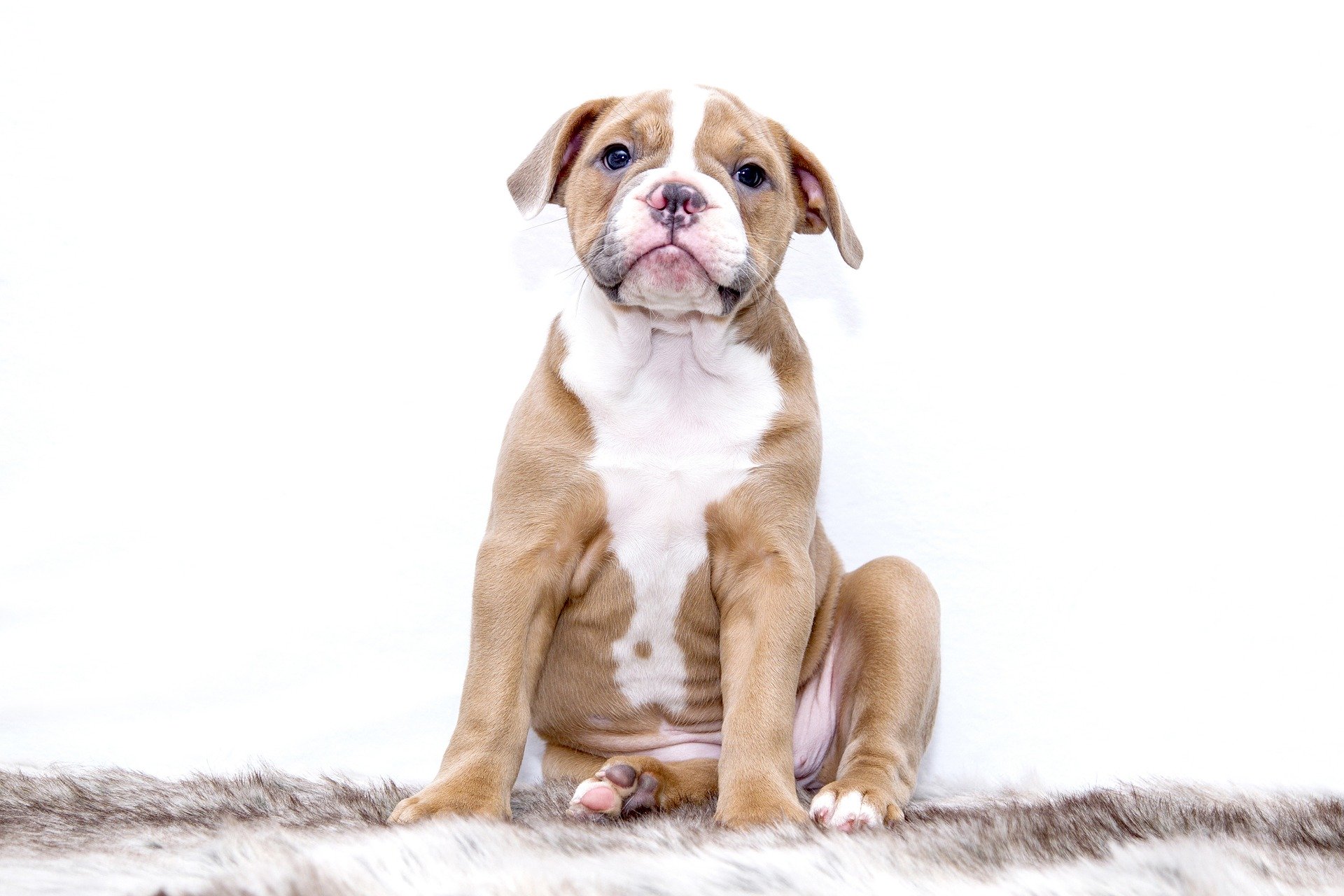
Many of the diseases are shared between humans and dogs and for that reason some are not less important than others, and that is because one of the ailments that can be most related is stomach.
At some point and for some circumstance, our dog could have a swollen and hard belly and this could be due to an indefinite number of things, that is why we will talk a little about what to do about it in these kinds of circumstances and how to combat it.
Causes of a swollen belly in dogs

- Gases: Like humans, dogs can also suffer from gas and this causes the gut to become inflamed and hard, so there are several reasons for this to happen:
- Sudden change in diet, type of feed, prepared meals, etc.
- Poor quality food.
- Poor digestion
- Accelerated intake or without chewing.
- Gastric torsion
- Ascitis
- peritonitis
- Obstruction
Although the situations to consider when our dog has a swollen and hard belly differ from whether the animal is a puppy or an adult, they allow us to know about the nature of the problem and make a small evaluation with which we can conclude on something.
If we go to the case of a puppy with a swollen and hard belly, then it is most likely due to a parasite problemThis is solved with a small treatment (previously prescribed by a health professional) and after that their respective vaccines, something that is done with more than eight weeks of age.
A puppy with a hard, swollen belly is more common and treatable than an adult, since most of these problems can be caused by breast milk, which already has many parasites, this making clear the importance of deworming when just have completed their fifteen days of life.
The detail with the vaccines is that they are not against all the different types of parasites and that is why there will always be a probability that these exist, and can be eliminated with a treatment of several doses per week.
Intestinal obstruction
A problem that manifests itself with swelling of the abdominal area, only that it will be soft. It is called intestinal obstruction, process of blocking the passage of the contents of the intestine through the gastrointestinal tract and this, in most cases, is due to the presence of some foreign object in it.
We have already said before that there are two levels of obstruction: partial and total. However, when this obstruction occurs in the first segment of the small intestine, the frequent symptom is vomiting in the form of a projectile.
On the other hand, if the obstruction occurs in the final segment of the small intestine, in addition to the distention of the abdomen, the dog will vomit liquid with a fecal odor and brown color.
The complete obstruction is extremely serious, since the dog will not be able to expel gases and not defecate, even the scenario of an intestinal strangulation is quite possible.
It also has multiple causes, the most common being:
- Hernias
- Tumors
- Stenosis.
- Foreign bodies in the intestinal tract.
- Invagination of one segment of the intestine into another
My dog has gas
Gases are generally caused by ingestion of air, and this in dogs happens when they feed at full speed and many times without chewing food, filling their stomach with air.
Another reason why your pet may be suffering from gas is due to its food intolerance, which is corrected with a proper diet recommended by the specialist.
The problem may also be directly related to a disease that we have described above. In any case, when the symptoms are persistent, it is appropriate to go to the veterinary consultation for evaluation and treatment.
Gastric torsion / dilation or gastric volvulus
This is another situation that needs urgent attention from the vet, as the consequences are often fatal. It does not imply the same torsion as expansion, since when there is expansion, the gut is distended by the effect of gases or liquid.
Torsion or volvulus instead, It originates when the stomach in a state of distention, rotates longitudinally and with it also rotates the spleen.
If the stomach rotates 180º we are facing a torsion, but if it rotates more than 180º it is what is called volvulus and this is when the situation can be aggravated for the dog, since when the pylorus moves, it exerts pressure on the duodenum and does not allows air and fluids to escape from the stomach.
The gastroesophageal area is also obstructed, so the dog cannot vomit or burp, all this content trapped in the stomach begins a fermentation process, gases are generated and the consequent distension of the belly.
The effects derived from torsion-expansion are bacterial septicemia, dehydration, gastric perforation, arrhythmias, peritonitis, and death of the dog. This situation can occur in any breed of dog, regardless of its age, although large-breed dogs are a bit more likely to suffer from them.
What symptoms does torsion / dilation have?
In these cases the pet You will be very restless, with prominent salivation, agitated, with nausea and attempts to vomit without success, the abdomen will be swollen and to the touch you may feel a lot of pain; being these that we have just indicated the most frequent symptoms.
However, torsion / dilation can manifest itself in other ways, such as a very tense abdomen when touched, lethargy and symptoms of discomfort without appearing extremely restless.
When the process is very advanced, the tongue and gums will become very pale, the pulse will be very weak, rapid breathing, as well as the heart rate, weakness and finally the collapse of the animal due to shock.
What is the treatment of torsion / dilation?
To treat a case of simple dilation, it will be enough for the veterinarian to insert a tube into the dog's stomach, thus also ruling out whether or not there is torsion. Once the tube reaches the stomach, the immediate reaction is for fluid and air to come out quickly, which immediately brings relief to the canine.
Immediately a gastric lavage is applied and fasting for 36 hours is recommended, to help you recover. The best way to rule out volvulus is by taking an X-ray, since the probe is not always able to detect it.
If the dog is in a state of shock, it will need emergency treatment and in most cases surgery, to move the stomach and spleen to their place or to remove the parts that have suffered necrosis, if applicable.
How can I prevent twisting / dilation?
- Avoid allowing the dog to ingest a large amount of water at one time.
- Divide your daily meal into three small, equal portions.
- Do not allow him to drink water an hour before and immediately after meals.
- Avoid fidgeting or exercising too much when you have a full stomach.
- Take him to the vet as soon as you notice the symptoms.
- Act quickly in case the problem recurs.
Canine ascites
The term ascites is a disease that is related to a swollen belly in dogs. It is how a fluid accumulation in the abdomen is known. This fluid comes from inside the cells, as well as from the veins and arteries, but, for some reason, it has "come out" and the fluids begin to reach areas where they should not, causing the whole organism to go into imbalance.
The causes for which ascites can occur are varied, but the most common have to do with digestive inflammation, bleeding, cancer, heart failure or even if the bladder bag ruptures.
The first symptom you will notice in your dog is a unjustified weight gain, in addition to that it will be much more swollen and annoying to the touch. In addition, it will be difficult for you to breathe, you will not feel like eating or drinking, and you may vomit.
Actually, the disease can take time to appear (in that time the symptoms will worsen, so many times the owners do not realize that there is a serious problem), or it may appear with a very rapid evolution in the process.
Anyway, it is important to go to the vet to have it examined. It is usually based on X-rays, laboratory tests, ultrasound or, in less common cases, abdominal punctures in order to know the type of fluid (whether it is blood or another type).
In principle, the treatment will be based on a medication (probably to eliminate the liquid), but depending on the cause that has caused it, it is likely that you will need a surgical intervention to eliminate the problem.
Fortunately, it is a disease that has a cure if caught in time, and it is not usually too serious (although that does not mean that you have to act quickly).
Canine peritonitis
Canine peritonitis is a situation that your dog can go through that it is characterized by having an acute abdomen, painful to the touch, with abdominal distention, weakness, depression, diarrhea and vomiting, etc.
This acute inflammation occurs suddenly, and occurs mostly in the tissues of the abdominal cavity. What happens is that there is fluid retention that causes an electrolyte imbalance, as well as dehydration. In a matter of hours, the dog can become seriously worse, going into shock or even going into a coma.
Among the symptoms that you are going to find with peritonitis, the first of them is going to be the tiredness, followed by trouble breathing, tremors, and later crying and moaning due to the intense pain that your pet will suffer. That is why it is recommended that you go to the vet immediately to avoid suffering.
The causes of canine peritonitis are related to viruses that affect either the stomach or the intestines (or both), intestinal parasites, uterine infections, holes in the stomach or intestines or even abscesses in other organs such as the pancreas, spleen ... Other causes that would lead to this disease are tumors, hernias, trauma in the abdominal area, gallstones or kidney, poisoning ...
Once you go to the vet, he can diagnose the problem, using not only palpation but also blood tests, ultrasounds, etc. In many cases, due to the situation of the animal, it may be advisable to sedate them so that they do not suffer and the professional can work more quickly. Once you have the cause that has caused the canine discomfort, this it is treated with medication and other therapies that help reverse the situation, for example fighting dehydration, relieving pain, or, if necessary, subjecting the animal to a surgical intervention.
More things people wonder:

Adult dog with a hard, swollen belly
The case of a hard and swollen belly in an adult dog is somewhat more worrisome, since the reason is very different from that of a puppy and is that here the problem may be due to a pathology associated with the stomach, where there is a torsion / dilation response that can endanger the dog's life without prompt attention.
The intervention in this case depends on two processes: a dilation due to the presence of liquids and gases in the intestine and the other is a torsion effect where the stomach rotates on its axis, like the spleen because it has distended.
Here the case is worrying, since neither gases nor liquids can leave the stomach, so the dog cannot expel them naturally (belching or vomiting) and this accumulation of gases and liquids is compressed in the stomach, also causing a number of bodily functions to begin to fail and cause the animal to go into shock .
The causes can be numerous, but the most common is that it is due to an intake of a considerable amount of food and then a demanding physical activity is carried out (also considering the intake of a large amount of liquid).
This would produce effects such as nausea with subsequent unsuccessful attempts to vomit, as well as impending swelling of the belly. In either case, you should go to the professional on duty, as this problem should not be taken lightly.
Feed your pet with moderate doses of food and fluids as well as well-distributed rest and exercise periods that begin gradually with the physical demand, after this you can have a healthy and fit pet.
My puppy's belly is swollen and hard
When the puppy has a very large, swollen and hard belly, it is most likely that it is full of intestinal parasites, which they contract from the mother's uterus, through breastfeeding, or by accidentally ingesting the eggs.
My dog is bloated and down
A swollen belly can be the product of several things, you can have poor digestion, you may have filled with gas when you eat and drink very quickly, or perhaps it is because you suffer from a torsion-dilation of the stomach.
The latter can also be the cause of the dog looking down, the important thing is that you receive the corresponding medical-veterinary care as soon as possible.
My dog has a hard stomach and complains
When the stomach becomes rigid to the touch and the dog does not tolerate pressure on that area, it moans in pain, so act immediately because they are part of the symptoms of a torsion-dilation of the stomach.
My dog has a swollen and soft belly
If the belly is dilated and soft, your dog may have an intestinal obstruction, although this symptom can also be present in the torsion-dilation. Remember that the best thing to do is go to the veterinarian for the correct diagnosis.
Tips to prevent your dog from having a swollen belly
No animal lover wants a dog, cat, or any pet to suffer. That is why you have to be very attentive to the needs they require. In addition, by way of prevention, there are some guidelines that you should follow in order to avoid greater evils, not only the causes of a swollen belly, but also other health problems.
Thus, the recommendations that we give you are the following:
A quality diet
We are not going to tell you that you should give it a specific brand of feed. Nor to tell you that you cannot give him homemade food. But whether it is one diet or another, it is important that it is characterized by being of quality.
Bargains, discounts, and cheap food often tempt us. Really a dog costs money to maintain: visits to the vet, vaccinations, food ... But offer a low-quality feed, or homemade food that is not recommended for the animal, the only thing that will cause is that its health suffers. Maybe not at that time, but over the years, especially when he is older and the ailments begin.
When buying a feed, consult your veterinarian. He will be able to advise you on both the feed that you have for sale (if you have them) and those that are on the market. In addition, depending on each pet, it can be more profitable (or healthy) wet food or even prepare homemade food based on its requirements.
Space the food and water
If your dog is a greedy dog, surely when you put food on it, it eats it in a matter of minutes, or it starts drinking and it seems there is no end. These behaviors, which in principle may not be abnormal for you, are actually very bad for dogs.
You need a dog to eat calmly so that the food does not make him feel bad, so that it does not get too full, and so as not to cause problems how is the stomach twisting. In fact, experts recommend that instead of once a day, they eat at least three meals. In other words, divide the portion of food in three times so that it is not so gluttonous.
And the same can happen with water.
No to exercise after eating (or before)
Taking him out for a walk and exercising is something you should do on a daily basis, but it is recommended that you do not do it just when he has finished eating, nor that he arrive and give him food and drink.
You need to have a rest time so that the food is not going to make you feel bad, nor so that it becomes a serious problem.
Beware of stress
A stressed dog is a dog that lives little. And is that when stress, anxiety and nerves dominate the animal, it can develop many diseases, including those that swell the belly.
Therefore, you have to try to have an adequate quality of life where you feel relaxed and happy.
We hope it has been useful to you.

Good, I got me a small dog but her belly is swollen and today it came out like a bag of liquid that I would recommend
Good night I have a 2-month-old puppy and he has a swollen belly and discomfort like fever and has 3 days with his swollen belly, the good thing is that he has not stopped eating every time he eats bigger, his belly gets and it hurts. say deworming but it does not reduce anything that I do that may be they tell me that it was a bad diet I am Yismarys I am worried about my dog thank you